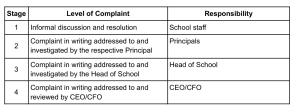Complaints Policy and Procedure
SBS Chiangmai is dedicated to delivering high-quality education and care for our students, and we are committed to listening to and addressing the views of parents and the wider community. Our aim is to ensure that any issues are resolved, and that all complaints are handled promptly and appropriately.
This procedure consists of four stages, and we take each complaint seriously throughout the process. It applies to parents of current students, prospective students, and those whose children have left the school.
A complaint is any expression of dissatisfaction, whether related to a perceived or actual issue. It can concern the school as a whole, a specific department, or an individual staff member.
Principles of the procedure
(taken from the IBO Complaints procedure)
To ensure the complaints process is effective, the following principles are applied throughout the complaints process and provide a framework for communication between stakeholders and SBSCM staff.
Fairness – we aim to have a fair complaints procedure that ensures everyone is treated equally.
Courtesy – all communication in relation to this procedure should be based on mutual respect, trust and courtesy.
Accessibility – we aim to have a complaints procedure that is easy to understand, easy to access and well publicised.
Timeliness – we aim to ensure that all complaints are dealt with in a timely manner.
Effectiveness – the complaints procedure is monitored and reviewed to ensure it continues to be effective.
Attentiveness – you will be given every opportunity to put forward your complaint, and you can be assured that we are listening. We will update you on the process and status of your complaint as appropriate.
Stages of Complaint and Guidelines
A complaint will normally fall into the following categories:

Stage 1: Informal Resolution
If you have a concern or complaint, it is hoped that, in the first instance, you will contact the relevant staff member(s).
As far as possible please follow the chain of communication below:
Primary and Early Years Pastoral or Academic Issues: Class Teacher > Principal
Secondary Pastoral Issues – Welfare, behaviour, attendance, general progress, general enquiries.
Homeroom Teacher > Vice Principal
Secondary Academic Issues – Progress, attainment, homework, examinations, subject enquiries.
Homeroom Teacher > Head of Department (where there is one) > Vice Principal
Enrichment Issues – Activities, sport or enrichment enquiries.
Vice Principal / Principal
General Issues from the parent body
Parent Rep > Principal. (The outcome will be communicated back to Parent Rep)
The vast majority of complaints/concerns will be resolved at Stage 1 but some may escalate through each category. If the matter cannot be resolved to your satisfaction within reason in 10 working days you are advised to move to the procedure outlined in Stage 2 below.
Stage 2: Written Formal Complaint to Principal
You should write to the Principal to request that they formally investigate your complaint. You should provide them with information explaining the specific nature of your complaint.
The Principal will acknowledge the complaint and decide the appropriate course of action to take.
It may be necessary for the Principal to carry out further investigations. The Principal may speak to you (normally within three working days) to discuss the matter and if possible, reach a resolution. If it is not possible to give you a full reply within this time – for example a detailed investigation is required – you will be told what action is being taken to deal with your complaint.
Once the Principal is satisfied that all relevant facts have been established, a decision will be made and you will be informed. The Principal will give reasons for the decision.
If following the Principal’s response, you are still not satisfied, you may wish to move to Stage 3 of this procedure. The Principal’s response will include details on how to do this.
Stage 3: Formal Complaint to Head of School
The Head of School will investigate the matter and then respond to you, included in the response will be information on how to proceed to stage 4 if you are still not satisfied with the school’s response.
Stage 4: Formal Complaint to CEO
The CEO or CFO will investigate the matter and then respond to you.
In all cases where the complaint concerns the Head of School directly – that is, the explicit behaviours of the Head of School as opposed to school policy or procedures, of which the Head of School may be considered a representative – the matter should be raised directly at Stage 4 or with the School Director. If raised at any other level it should immediately be escalated to stage 4.
Guidelines
- Initially complaints or concerns may be verbal or written, and addressed to the relevant member of staff.
- If the issue can not be resolved at stage 1 (informally) then the complainant must formalise their concerns in writing so as to avoid ambiguity.
- Issues should be acknowledged and then considered within 10 working days.
- All communications between parties may be recorded in written form by a SBSCM staff member..
- The School Principal, Head of School or CEO/CFO will decide the best person(s) to address the complaint, but will take responsibility for the issue from first receipt to resolution. In most instances, there will need to be an investigation in order to understand the circumstances surrounding the complaint. The Principal and Head of School reserve the right to escalate the complaint to the next level where appropriate.
- As a matter of course, the relevant line manager to the member of staff dealing with the complaint/concern will be informed of the concern and the outcome.
- All individuals have the right, at any stage, to be accompanied or represented by an appropriate adult at discussions and hearings. This includes the right of teachers to be accompanied by a colleague.
- Details of the complaint/concern and action taken, if applicable and appropriate, are recorded in the relevant student or staff file, with a clear summary of the resolution.
- The individual who made the formal complaint should be informed of any findings or recommendations taken to resolve the matter in writing (stages 2, 3 and 4).
- Although each of the stages within the procedure should occur consecutively, it is not necessary for each stage to follow the last immediately. Complainants may need some time to decide whether or not they wish to pursue the matter any further and how to do this (move to the next level)
- The Head of School may seek advice from the schools legal team according to the complexity of the complaint and resolution.
Circumstances under which this procedure should not be used
- Child protection procedures
- Student exclusions
- Student admissions
- Issues related to criminal investigations and employee grievances must also all be handled separately from this procedure. The Head of School, Executive Committee or School Lawyer will advise in this circumstance.
This complaints procedure is distinct from formal staff disciplinary/competency proceedings, which are detailed in contracts.
Monitoring and recording complaints
At all stages of formal complaints (levels 2, 3 and 4), the details of the complaint and follow up action are recorded and stored by the Principal, Head of School or CEO for two years or as required.
The school will maintain in summary form a record of complaints received and the outcomes, this record will contain all complaints received and will be regularly updated. This summary information will be accessible to senior and group leadership for monitoring quality and consistency. Details in the summary will include: within the school who has received the complaint, the nature of the issue, the person who will deal with it, the action assigned, whether it needs to be escalated and its current status.
Findings and Recommendations
At each formal stage of the complaints procedure, any findings and recommendations will be communicated to the complainant and, where relevant, the person complained about. It may be appropriate for the School to offer one or more of the following:
- A justification;
- An apology;
- A contextual explanation;
- An admission that the situation could have been handled differently or better; 5. An assurance that the event concerned will not recur;
- An explanation of the steps that have been taken to ensure that it will not happen again;
- An undertaking to review school policies in light of the complaint.
Confidentiality
Complainants have the right to know that correspondence, statements and records relating to individual complaints are to be kept in appropriate confidence according to the Personal Data Protection policy.
Appeals
If, during levels 1, 2 or 3, as the result of a complaint, a decision or course of action is taken with regards to an individual (apart from the complainant) which they feel is ungrounded, unjustified or incorrect they have the right to immediately escalate to the next level.
Submitting a complaint
Anything submitted that appears to be a formal complaint will be treated as such, however the forms provided in the Appendices may be used to facilitate a quick response. They may be submitted by email to [email protected] or by hand to the admissions department (The envelope should be clearly labelled with Complaint from ….)
Please note that anonymous complaints can not be processed or responded to.
